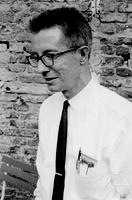H. J. Ryser
| Herbert John Ryser | |
|---|---|
 | |
| Born |
July 28, 1923 Milwaukee, Wisconsin |
| Died |
July 12, 1985 Pasadena, California |
| Residence | United States |
| Fields | Mathematics |
| Institutions | University of Wisconsin –Madison |
| Alma mater | University of Toronto |
Herbert John Ryser (July 28, 1923, Milwaukee, Wisconsin – July 12, 1985, Pasadena, California) was a professor of mathematics, widely regarded as one of the major figures in combinatorics in the 20th century.[1][2] He is the namesake of the Bruck–Ryser–Chowla theorem and Ryser's formula for the computation of the permanent of a matrix.
Early life
Ryser was born to the family of Fred G. and Edna (Huels) Ryser. He received the B.A. (1945), M.A. (1947), and Ph.D. (1948) from the University of Wisconsin.[3] His doctoral thesis "Rational Vector Spaces" was supervised by Cornelius Joseph Everett, Jr. and Cyrus C. MacDuffee.[4] (Ryser was Everett's only doctoral student.)[5]
Career
After his Ph.D., Ryser spent a year at Princeton's Institute for Advanced Study, then joined the faculty of Ohio State University. In 1962 he took a professorship at Syracuse University, and in 1967 moved to Caltech.[6] His doctoral students include Richard A. Brualdi, Clement W. H. Lam, and Marion Tinsley.
Ryser contributed to the theory of combinatorial designs, finite set systems, the permanent, combinatorial functions, and to many other topics in combinatorics.[1] For many years, he served as editor of the journals Journal of Combinatorial Theory, Linear and Multilinear Algebra, and Journal of Algebra.[1] Ryser's estate funded an endowment creating undergraduate mathematics scholarships at Caltech known as the H. J. Ryser Scholarships.[7]
The Journal of Combinatorial Theory Series A denoted two issues after Ryser's passing as the "Herbert J. Ryser Memorial Issue", parts 1 and 2.[8]
Books
- Combinatorial Mathematics (1963), #14 of the Carus Mathematical Monographs, published by the Mathematical Association of America. ISBN 0-88385-014-1. Republished and translated into several languages.
- Brualdi, Richard A.; Ryser, Herbert John (1991-07-26). Combinatorial matrix theory. Cambridge University Press. ISBN 978-0-521-32265-2.
Selected papers
- Ryser, H. J. (1987). "Combinatorial Properties of Matrices of Zeros and Ones". Classic Papers in Combinatorics: 269–275. doi:10.1007/978-0-8176-4842-8_18.
- Bruck, R. H.; H. J. Ryser (1949). "The non-existence of certain finite projective planes". Canadian Journal of Mathematics: 88–.
- Ryser, H. J. (August 1951). "A combinatorial theorem with an application to Latin rectangles" (PDF). Proceedings of the American Mathematical Society (American Mathematical Society) 2 (4): 550–. doi:10.1090/s0002-9939-1951-0042361-0.
References
- ↑ 1.0 1.1 1.2 Ryser's biography at the Ohio State University website
- ↑ Bolian Liu; Hong-Jian Lai (2000). Matrices in combinatorics and graph theory By , x. Springer. pp. xi. ISBN 978-0-7923-6469-6. Retrieved 7 January 2011.
...Herbert John Ryser, who can rightfully be considered the father of Combinatorial Matrix Theory...
- ↑ Richard A. Brualdi: "In memoriam: Herbert J. Ryser", Journal of Combinatorial Theory Series A 47(1) (January 1988), pp. 1–5
- ↑ H. J. Ryser at the Mathematics Genealogy Project
- ↑ Lagarias, Jeffrey C. (2010). The ultimate challenge: the 3x+1 problem. American Mathematical Soc. pp. 228–. ISBN 978-0-8218-4940-8. Retrieved 27 June 2011.
- ↑ "Emeritus Professors – 1985" (PDF). Engineering & Science Magazine. September 1985. p. 30. Retrieved 2010-07-18.
- ↑ California Tech, "Mathematics Awards", May 17, 1991, page 1. (Scan of that page on-line via on-line archives at the newspaper.)
- ↑ Richard A. Brualdi (1988). "Papers to Appear in The Herbert J. Ryser Memorial Issue, Part Ii". Journal of Combinatorial Theory Series A 47 (2). Retrieved 7 January 2011.
|